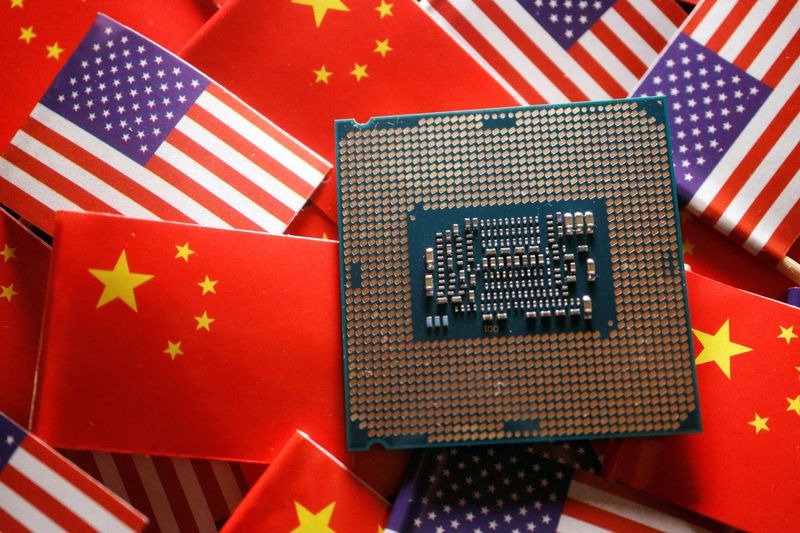Investing.com -- The Biden administration has announced stricter measures to limit China’s access to key chipmaking components and AI technologies, Bloomberg News reported Monday, intensifying efforts to curtail Beijing’s technological advancements.
The new rules from the Department of Commerce include tighter restrictions on the sale of high-bandwidth memory (HBM) chips and chipmaking equipment, even for items manufactured by US companies abroad. Moreover, 140 Chinese entities have been added to a blacklist for allegedly advancing Beijing’s technological objectives, though the department’s initial statement did not identify them.
Bloomberg previously reported that these regulations are less severe than earlier drafts, which helped trigger a rally among global semiconductor suppliers, including Tokyo Electron Ltd. (TYO:8035) in Asia and ASML Holding (AS:ASML) in Europe.
The administration’s aim is to slow China’s ability to develop advanced semiconductors and AI systems, which could bolster its military capabilities. The latest sanctions and updated Entity List will be detailed in full later on Monday, the report said, citing a US official source.
The US plans to “restrict the PRC’s ability to produce technologies key to its military modernization or repression of human rights,” the Bureau of Industry and Security said in a statement. It also noted the inclusion of “semiconductor fabs, tool companies, and investment companies” on the Entity List for their role in advancing China’s chip production goals.
Negotiations on these restrictions involved extensive consultations with foreign governments over the past year. Major semiconductor companies, including US firms Lam Research (NASDAQ:LRCX), Applied Materials (NASDAQ:AMAT), and KLA Corporation (NASDAQ:KLAC), along with competitors Tokyo Electron and ASML, engaged in lobbying efforts to balance market access with security concerns.
According to Bloomberg, the rules target two dozen types of manufacturing equipment and three software tools, with certain exemptions for countries capable of implementing similar controls, such as Japan and the Netherlands. While those nations have not publicly committed to matching these measures, the US is encouraging them to enact comparable policies.
A key aspect of the rules is the application of the foreign direct product rule (FDPR), which allows the US to regulate goods made abroad using any US technology. This provision seeks to prevent US toolmakers from bypassing trade restrictions by shifting production overseas.
A report from the Center for Strategic and International Studies highlighted that US firms have increased exports to China from non-US locations since 2016, with notable growth since 2019.
“This action is the culmination of the Biden-Harris Administration’s targeted approach, in concert with our allies and partners, to impair the PRC’s ability to indigenize the production of advanced technologies that pose a risk to our national security,” said Secretary of Commerce Gina Raimondo.
“No Administration has been tougher in strategically addressing China’s military modernization through export controls.”
The latest measures also include restrictions on HBM chips, which are crucial for AI applications. The rules cover HBM2 and newer chips and apply to US and foreign firms through FDPR.
Leading providers of HBM chips include SK Hynix Inc (KS:000660) of South Korea, Micron Technology (NASDAQ:MU) of the US, and Samsung Electronics (KS:005930). Exemptions allow Western firms to package HBM2 chips in China, provided such activities pose minimal risk of aiding Chinese firms.
